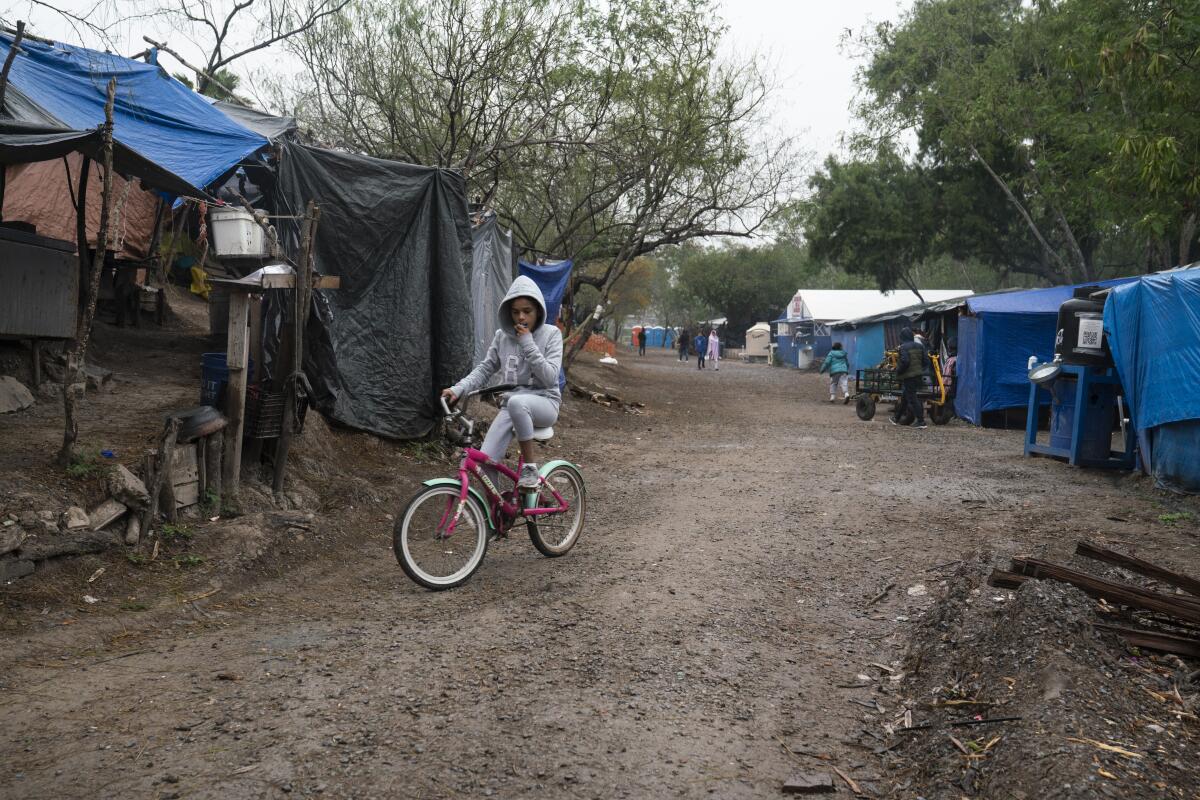Democrats unveil broad immigration reform bill with citizenship path for 11 million

- Share via
WASHINGTON — President Biden made official on Thursday his aggressive opening salvo in a decades-long effort to reform a broken U.S. immigration system, which ground to a near-halt under his predecessor.
Democratic lawmakers introduced the legislation that Biden officials touted on his first day in the White House — an ambitious bill that would offer a pathway to citizenship for an estimated 11 million immigrants in the United States without legal status.
With Democrats having a tenuous hold on both chambers of Congress, progressives have pushed the Biden administration to go “big, bold and inclusive” on immigration reform, as Rep. Linda T. Sanchez (D-Whittier) and Sen. Robert Menendez (D-N.J.), the bill’s chief sponsors, put it in a statement Wednesday.
Republicans, for their part, began to decry the bill before it was announced, a potential sign that Biden’s proposal may join the congressional graveyard of efforts before it under both Democratic and Republican administrations.
“I look forward to working with leaders in the House and Senate to address the wrongdoings of the past administration and restore justice, humanity and order to our immigration system,” Biden said in a statement Thursday. “These are not Democratic or Republican priorities — but American ones.”
But administration officials said that “this is not a bipartisan bill,” and they signaled Wednesday that they view it more as an opening bid and don’t necessarily expect it to pass with the needed Republican support in its current form.
“It is his vision of what it takes to fix the system,” one White House official said in a call with reporters, speaking on condition of anonymity without providing a reason, “and it’s also a chance to kind of reset and restart conversations on immigration reform after the last four years.”
At a news conference Thursday introducing the bill, Menendez, the highest-ranking Latino in Congress, said he knows the path forward will demand negotiations, but he refused to make concessions from the start, calling it “the righteous thing” to do.
“There are some in Congress, I’ll say from both parties, who argue against going big on immigration reform,” Menendez said. “Some still believe the answer lies in locking all legal channels of our immigration system until we get our house in order. Others say we should leave the bigger, tougher questions for another day, pursuing narrow reforms that nibble at the edges and leave millions of people behind. Personally, I couldn’t disagree more with both approaches.”
Menendez cautioned that the approach is not all or nothing but, rather, emphasizing the goal of robust immigration reform.
Sanchez called it an “all-of-the-above strategy.”
“There are other great immigration bills that we also will be taking up and hopefully passing as well,” she said. “But our focus is most definitely on the U.S. Citizenship Act moving forward today.”
White House officials offered few new details to the outline they unveiled last month, when they said the bill was sent to Congress.
Its centerpiece is an eight-year path to citizenship for the approximately 11 million immigrants in the United States without legal status, with a five-year wait for permanent legal status, often referred to as a green card, and three more years before citizenship is granted.
That eight-year total is shorter than 13 years called for in the last failed comprehensive immigration reform effort in 2013, when a bill spearheaded by the bipartisan Gang of Eight, including Menendez, passed the Senate but died without then-House Speaker John A. Boehner bringing it to a vote.
The legislation also offers green cards to beneficiaries of the Deferred Action for Childhood Arrivals program, or DACA, who were brought to the U.S. as children, and to thousands of people with Temporary Protected Status, or TPS, afforded humanitarian protection due to insecurity in their home countries, as of Jan. 21, 2017, according to administration officials.
Farmworkers who “can show some backward-looking work history” will also be able to “go directly” to permanent legal status, with applicants in all three categories required to pass security checks.
Some Republican legislators called the bill a nonstarter. Rep. John Katko (R-N.Y.), the leading Republican member of the House Committee on Homeland Security, said in a statement that the bill is more a symbolic marker than a viable product for congressional debate.
“Most of the ‘border security’ provisions in this proposal require [the Department of Homeland Security] to develop plans and strategies that have already been required by Congress or already exist. It therefore would not result in substantial and needed improvements at the border, while at the same time calling for immediate action on a broad range of immigration law changes,” he said.
“I welcome an honest policy discussion about the changes Congress needs to make to secure the border, and the lukewarm provisions in this bill do not come close.”
As Republicans denounce Biden’s efforts to roll back President Trump’s more than 1,000 measures to restrict immigration, saying the Democrat’s early moves are causing an increase in apprehensions at the border dating to last year, White House officials have stressed that the fast track to legal status will apply only to those who were in the United States by Jan. 1.
Administration officials framed the legislation as steps to “better reflect the president’s values on immigration,” such as changing the term “alien” in the Immigration and Nationality Act, the foundation of the U.S. immigration system, to “noncitizen.” It follows a memo, first reported by BuzzFeed, directing Homeland Security officials to not use the dehumanizing term, common in U.S. law, in their communications.
The bill also moves to clear often decades-long backlogs for family members by exempting spouses, permanent partners and children under age 21 from per-country caps that limit their numbers, and raising the limits for other family- and employment-based visas.
The legislation would increase diversity visas to 80,000 from 50,000 and prioritize applicants who’ve been waiting more than 10 years or have advanced science, technology, engineering or science degrees.
Certain regions in the U.S., officials said, could apply for additional visas to support economic development through a five-year program authorized by the Homeland Security Department, so long as they certify there are available jobs and no workers to fill them.
The bill would also eliminate hurdles that can keep immigrants in the United States without legal status from reentering the country for up to 10 years.
As one of his first moves in office, Biden repealed Trump’s travel ban, which targeted majority-Muslim and African countries.
The legislation would go further, repealing other Trump-era restrictions against asylum seekers and refugees as well as instituting measures to prevent future bans.
The legislation would also seek to counter Trump’s targeting of asylum, officials said, by ending the one-year limit on filing asylum claims; increasing funding for Citizenship and Immigration Services to reduce a backlog that’s reached a record 1.3 million cases; providing for more immigration judges and support staff; and increasing access to legal counsel, particularly for children and other vulnerable groups.
The bill would additionally triple the number of available U visas, for victims of crime or those who aid law enforcement. As one of his last immigration moves in office, Trump sought in September to narrow eligibility for U visas.
Notably, the Biden administration’s proposed bill doesn’t tie immigration benefits to border enforcement, as past efforts have done, in part to garner Republican support. Officials said it will instead focus resources on countering drug and human trafficking networks, bolstering transnational anti-gang task forces in Central America and enhancing border technology, particularly at ports of entry, where most smuggling occurs.
It also includes a four-year plan to increase assistance to El Salvador, Guatemala and Honduras conditioned on leaders’ ability to reduce corruption, violence and poverty.
“If my choice as a Central American citizen is to stay and die, or stay and see my daughter raped, or stay and see my son forcibly put into a gang, I’m going to flee,” Menendez said. “And so until we deal with those root causes, we are going to continuously have a challenge.”
The introduction of the high-profile bill — a signal that Biden plans to make immigration reform a legislative priority even as he seeks to quickly address the COVID-19 pandemic and its economic fallout — also increases the focus on his commitment to undoing Trump’s immigration policies as he faces another early test this week.
On Friday, U.S., Mexican and United Nations officials will begin processing some of the more than 25,000 asylum seekers believed to be stuck south of the U.S.-Mexico border under a Trump policy known as “Remain in Mexico” that forced them to wait there on cases in U.S. immigration courts. The renewed processing will start at the port of entry in San Ysidro, Calif., officials told The Times. Biden had said he’d end the program but instead paused it.
Repeatedly asked about how they will get GOP support for the bill — at least 10 Republican votes are needed to pass the legislation under standing Senate rules — or whether they’d use a process known as budget reconciliation, which would potentially allow the administration to push it through with only Democratic support, White House officials deflected.
One official specifically referenced the failed immigration reform effort of 2013, saying, “A number of significant compromises were made in the end to get votes.”
“We’re focused on what works,” the official continued. “What’s clear that does not work is just having a wall and not addressing the reasons why people are coming or creating legal channels for them.”
On Thursday, White House Press Secretary Jen Psaki made clear they view the bill as a starting point for negotiation, saying, “We certainly understand that the sausage that comes out of the machine on the other side will look different from the sausage that’s introduced today.”
Roberto Suro, a public policy professor at USC who has followed immigration issues for decades, said a huge comprehensive immigration bill will be a “necessarily long and difficult process.”
But the strategy may ultimately fail, he said, because there simply aren’t enough votes to pass such a bill anytime soon given that other bills related to pandemic relief will probably take priority.
Suro said Biden is probably responding to Sen. Richard J. Durbin (D-Ill.) reintroducing Dream Act legislation this month that would provide a pathway to citizenship for immigrants who are in the country without legal status after they were brought to the U.S. as children.
“This is the White House signaling to the Hill, ‘We haven’t given up on comprehensive immigration reform,’” Suro said. “The question is, where is the real play going to happen? Is it going to be the Dream Act — a one-shot narrow focus — or are they going to go for” a comprehensive overhaul?
Erika Andiola of the Refugee and Immigrant Center for Education and Legal Services called the bill “a good symbolic gesture, but it’s not enough.”
“Now is the time for Democrats to use every tool at their disposal to provide protection to the immigrant community without relying on the party of Trump and without compromising on further inhumane enforcement,” Andiola said in a statement.
“We have lived through many broken promises on immigration.”
Times staff writers Cindy Carcamo in Los Angeles and Molly Hennessy-Fiske in Houston contributed to this report.
More to Read
Sign up for Essential California
The most important California stories and recommendations in your inbox every morning.
You may occasionally receive promotional content from the Los Angeles Times.












